The Devil Often Wears Entrepreneur
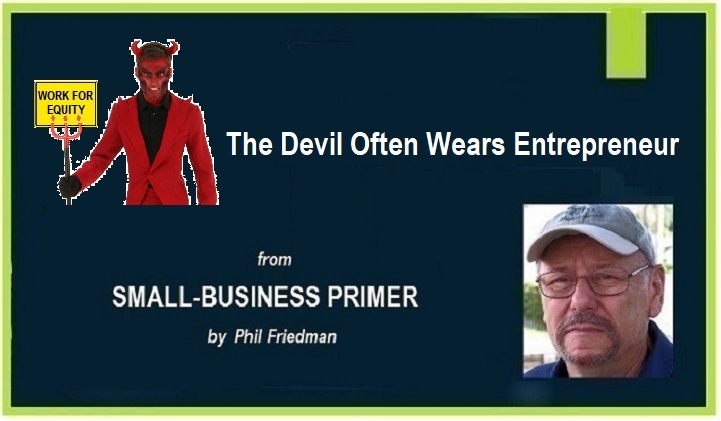
ACCEPTING EQUITY IN PAYMENT FOR SERVICES RENDERED OCCASIONALLY WORKS OUT, BUT MORE OFTEN DOESN'T...
Preface: This is the fourth installment of a serialization of my upcoming eBook, "Small-Business Primer: Real -World Tips for Starting and Running Your Own Small Business".
Subsequent installments will be published at irregular intervals over the next year. Should you not want to wait for the serialization to run its course, details of how to secure a copy of the book in its entirety will be found at the end of this article.
The "case studies" cited in this series generally involve the reorganization and expansion of boat yard operations which I've undertaken over the last decade of so, as part of my core consulting business. Keep in mind, however, that the suggestions and lessons-learned detailed here are equally applicable to just about any small-business operation that sells products and/or services.
When you run your own small business ― especially if it involves providing consulting or other services ― you will, from time to time, be offered equity in a client's company in lieu of cash payment. Sometimes, you will be tempted accept it. But be aware that, if you do, you'll likely end up working for nothing.
To be sure, in a few instances, vendors or employees, who have "partnered" with a startup by accepting equity or stock options in lieu of cash, have made a killing when the startup in question rocketed to huge success.
Unfortunately, the probability of that occurring is about the same as the ratio of wildly successful start-ups to those which fail. For the hard fact is, in such circumstances, you almost always lack any substantive control over whether the client is ultimately successful or not.
Granted, declining such offers is made difficult by a natural desire to gain the work and not chase away a prospective client ― even if, as in my case, you've been negotiating agreements for nearly three decades.

But, don't take the bait...The key is to set appropriate standards for yourself and your small business when negotiating an agreement... And to stick to those standards.
Consider a relatively recent experience of mine.
Several weeks ago, I received a query via Linkedin, from a prospect. He said he had reviewed my profile and work samples on LinkedIn and was very interested in securing my consulting input on his most recent project.
He explained further that he was a "tech guy" and a "serial entrepreneur" who was developing a new app for the marine industry. He'd recently lost a partner who had been serving as the industry expert for the project and that, while he and his team had the coding expertise to complete the app, none of them really knew anything about the marine industry.
According to the prospect, they would be looking to me to help with the design of the UX at the front-end (which had to fit the industry-specific users), as well as with the objectives for output at the backend (which had to fit the real needs of those users). He was also looking for strategic marketing advice for the marine industry. Finally, he estimated they'd need about ten hours per week of my time and a face-to-face once a month, on average.
I said I could comfortably work that into my current schedule and would be pleased provide him with the information and guidance he was looking for. Our telephone discussion ran on for about an hour, during which time I gave him a couple of concrete strategy suggestions as to the form the app needed to take in order to be accepted by the industry ― a kind of teaser demonstration of what I had to offer ― and then explained my fee structure.
He said he wanted to move forward right away, and I suggested we meet either for breakfast or at his office to wrap up the deal in person. After setting a date and time, I said I'd send him a copy of my standard form of agreement for him to review prior to our meeting in person.
Finally, I expressed what has become my standard caution...
I said, "Pardon me for saying this, but I have, at times in the past, been contacted nominally to provide consulting services when, in fact, the potential client wanted to solicit me for an investment into his or her business. So to save us both from wasting time and energy, please understand I am not in the market to make any kind of investment at this time."
He said he understood completely and that this was not about that at all. He was raising the necessary capital on his own and that what he really needed was marine industry specific advice in helping to shape the app at a macro-level. We agreed to meet the following week for breakfast.
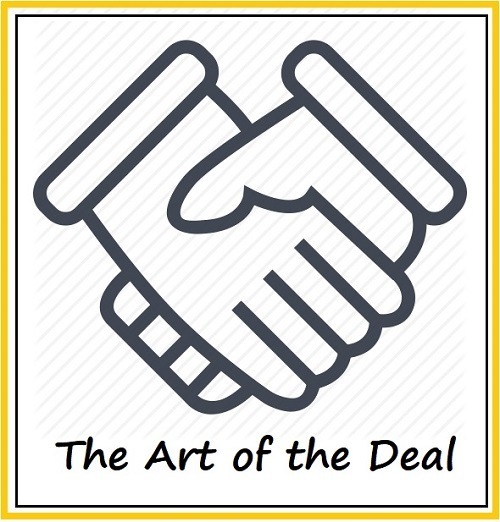
My wife and business partner, who is often more perceptive about people than I am, told me I was wasting my time. But I was coming off a major pretty profitable two-year gig and would not have my enthusiasm dampened. You know, positive attitude and all that stuff. So I spent several hours preparing for the meeting and feeling good about the chances of landing the contract. Then my entrepreneurial prospect and I met.
The first red flag went up when he asked me to go over my billing structure again ― for I had made it very clear in our prior telephone conversations.
The second red flag popped up when he asked me if I'd accept an equity position in the new company in lieu of cash payment. Notwithstanding that I had specifically addressed this during our earlier telephone conference, I calmly restated my billing rates and reiterated that I was not interested in investing in his startup ― not because I didn't like his idea, but because I didn't know very much about him or his entrepreneurial track record.
He backed off quickly and said he understood and wanted to proceed in any event. So we agreed on the scope of work, the fee structure, and that I would draft an agreement for review and signatures within a day or two.
He then pulled out a list of a dozen specific questions he said he hoped to get answered before we wrapped up our meeting. Red flag number three.
By then, my enthusiasm was definitely waning. However, you never really know for sure. So I took the list of questions and said I would begin work immediately and have the answers ready by the time we had mutually executed a consulting agreement. He agreed without further discussion. We finished our breakfast, shook hands on the deal, and each went our separate ways.
When I told my wife about the meeting, she repeated her previous warning. But I told her I'd made it all very clear and just couldn't see why he'd want to waste his time if he didn't intend to execute. I then spent a day sending my standard form of agreement to the prospect, modifying some of the terms to fit his requests, and executed at my end with a copy to him for his signature, which he added to the document, with a copy back to me.
I gave my wife a rousing Bronx cheer, which I enjoyed almost as much as "landing" the gig. Unfortunately, several days passed without the retainer check specified in the agreement showing up.
Okay, let me back up a bit. For as long as I can now remember, my standard practice has been to ask for an initial "retainer" with the execution of an agreement for my consulting services. My billing is then generally done monthly on the basis of what is called in accounting "in arrears", that is, after the fact.
For example, if billing is to be done monthly, I ask for a month's retainer up front. Then bill the agreed monthly amount at the end of each month subsequent to the initiation of the contract term, with the held retainer applied against the last month's bill. And assuming I'm billing on a monthly basis, this protects me in the event of non-payment, as long as I don't let the client get more than one month in arrears.
I usually construct the initial retainer to equal the anticipated amount for one billing period. If billing monthly, then the retainer equals one month's anticipated billing. If billing is to be bi-monthly, the retainer would be equal to the anticipated billing for a two-month period.
Anyway, in this case, my entrepreneurial prospect called me after about a week to explain he wanted to go ahead with the work right away, but that his cash flow was structured such that he always paid at the end of the month. Big FLASHING red flag number four.

Not wanting to be overly rigid, I offered as a courtesy to reduce the retainer by 50% and adjust the billing period to bi-weekly ― which accommodation he declined, saying he preferred simply to wait until the end of the current month to begin work under the agreement.
I can't say for certain what would have happened had I gone ahead to do at least the initial the work out ahead of being paid. But my best guess is that, at the end of the first month, there would have been an excuse for not paying timely, which excuse would have been extended for the next month and so on until an offer for equity in lieu of cash payment was finally made.Clearly, the deal was dead. Indeed, it was very likely never alive in the first place, as it was unlikely the intent to actually pay cash for the work ever existed...
In knowledge- and experienced-based consulting, the consultant is being paid not so much for what he or she does, but for that which he or she knows. And the major portion of the benefit to the client is delivered during the first 25% to 35% of the projected term, with the remainder of the term devoted primarily to implementation and fine-tuning. Consequently, if a startup client gets out ahead of you by, say three or four months on a one-year contract, your prospects of collecting fully for the value you've delivered drop dramatically.
Negotiating a consulting or other agreement for services to be rendered is always a balancing act. You don't want to leave more on the table than necessary, but at the same time, you don't want to overprice and, as a result, lose the job.Unless, of course, you're dealing with a well-capitalized startup. In which case the startup should be able to pay a nominal retainer up front to secure, at least pro forma, the future billings...
Moreover, a lot depends on how busy or hungry you are at the time. If you're in the midst of a lull you might choose to work for the time being at a discount from your normal rate. Or you might elect to take more of a chance on eventually collecting your fees due via stock options (always preferable to minority equity). But you always have to balance the risks against your potential gains and losses.
Keep in mind that those potential losses include not only the time and effort you might expend directly on a given project but also the cost of "lost opportunity". That is the cost to you of being busy with work for which you may not ultimately be paid, while you are not pursuing generation of work for solid clients who will pay you.
Keep in mind also that, in a startup situation, if you accept equity in lieu of either full or partial payment in cash, you are betting not only on the idea (which might be off-the-charts great) but also on the abilities and tenaciousness of the entrepreneur involved, not to mention his or her integrity. And the fact is, in the world of Internet-based startups, someone needs only a computer, a telephone, and maybe some decent clothes in order to call him- or herself an "entrepreneur." And many self-declared "entrepreneurs" these days apparently think nothing of working people for free information and the unpaid benefit of their services.
Which is why you should always remember that the Devil often wears Entrepreneur.
Now, if you will excuse me, I have to get ready to take my wife out to dinner, in order to make up for that Bronx cheer I threw at her when she tried to talk some sense into me. Good thing she doesn't care for Prada ― or I'd really be in deep financial do-do. ― Phil Friedman
Postscript: This is an excerpt from my upcoming eBook, Small-Business Primer: Real -World Tips for Starting and Running Your Own Small Business. For information on securing a copy, email phil@portroyalgroup.com and put "small-business book" on the subject line.
Author's notes: If you found this article of value, you might also want to look at some of my other writing about small business operations, management, and marketing:
"Common Myths About Starting Your Own Small-Business""Tips for Successful Consulting"
To receive notifications of my writings on a regular basis, click the [FOLLOW] button on my beBee profile. Better yet, click [Subscribe To This Blog by Email]. As a writer-friend of mine says, you can always change your mind later.
And feel free to "like" and "share" this post and my other LinkedIn articles — whether on LinkedIn, Twitter, Facebook, or Google+. I ask only that you credit me properly as the author, and include a live link to the original work.
About me, Phil Friedman: With 30 some years background in small business and the marine industry, I've worn numerous hats — as a yacht designer, boat builder, marine operations and business manager, marine industry consultant, marine marketing and communications specialist, yachting magazine writer and editor, yacht surveyor, and marine industry educator. I am also trained and experienced in interest-based negotiation and mediation. In a previous life, I taught logic and philosophy at university.
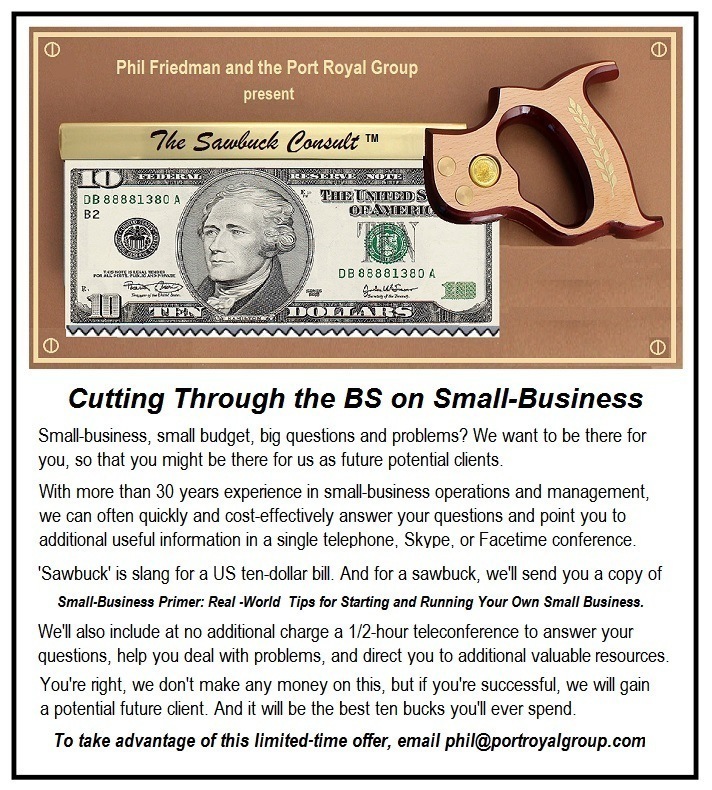


#SMALLBUSINESS #BUSINESSMANAGEMENT #BOOSTPROFIT #BETTERBUSINESS #BUSINESSCONSULTING #ENTREPRENEURSHIP #STARTYOUROWNBUSINESS #ENTREPRENEUR #BUSINESSSTARTUP #RUNNINGYOUROWNBUSINESS
Articles from Phil Friedman
View blog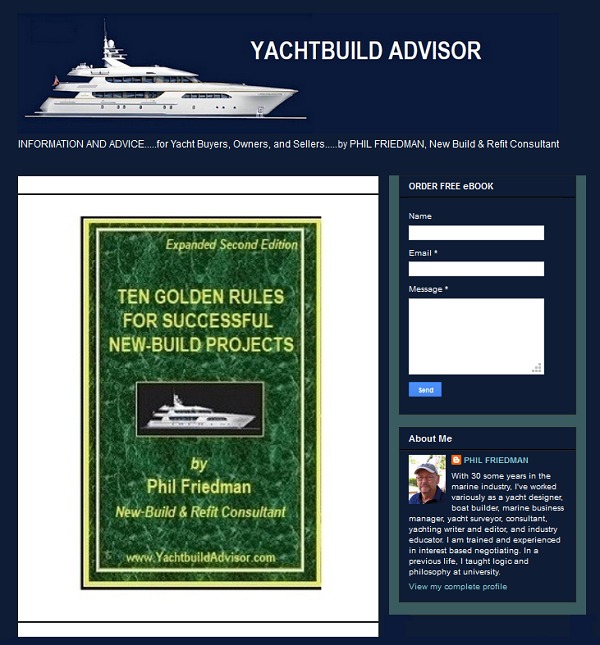
THE UPDATED AND EXPANDED SECOND EDITION OF THIS WELL-RECEIVED E-BOOK IS NOW AVAILABLE... · More than ...
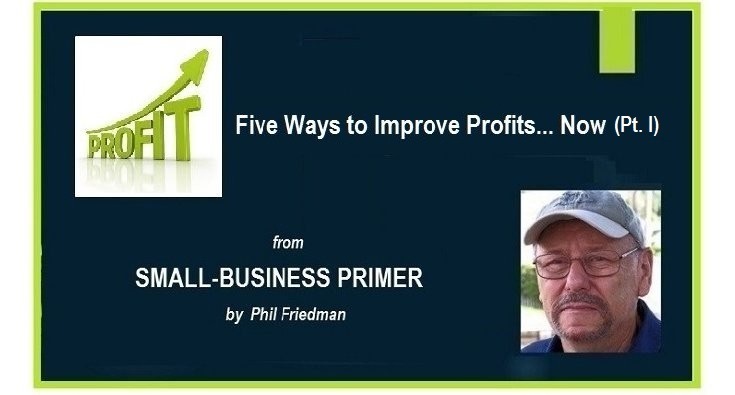
PRACTICAL STEPS FOR HIGHER GROSS PROFIT WITHOUT ADDED OVERHEADS... · Preface: · This is the first in ...

THE DYNAMIC DUO OF DUMPING-ON-EVERYTHING IS BACK … EDGIER THAN EVER… · PHIL: Well, Jimbo, it’s been ...
Related professionals
You may be interested in these jobs
-

Cardiology, Echocardiography Cardiologist
Found in: Jooble US O C2 - 1 day ago
Bon Secours Mercy Health Petersburg, VA, United StatesGrow your Non-Invasive Cardiology Practice in Petersburg, Virginia · Bon Secours Mercy Health · Southside Regional Medical Center · Petersburg, Virginia · Non-Invasive Cardiologist · Bon Secours Cardiology is hiring a A Non-Invasive Cardiologists to be part of a new practice ...
-
Java Developer
Found in: Lensa US 4 C2 - 1 week ago
INSPYR Solutions Winter Park, United StatesTitle: Java Developer · Location: Orlando, Fl remote · Duration: 6 month contract to hire · Compensation: 60 an hour 120k salary · Work Requirements: US Citizen, GC Holders or Authorized to Work in the U.S. · Skillset / Experience: Senior Software Engineer position is responsible ...
-

General Laborer
Found in: Indeed US C2 - 2 days ago
Proman Staffing Agency Farmington, United States Full timePROMAN Staffing is looking for a Seasonal Temp for Shop (Outdoors)5 days a week (could be a Saturday with one weekday off) · Pay starts at $13.00/hr. · Duties Include (not limited too) · -Load and unload equipment · -Setting up and tearing down tents · -working outdoors in variou ...

Comments
Phil Friedman
5 years ago #31
@del me - Sorry bud, for some reason I missed your comment last September. But I'd like to answer it now -- if you're still around to see it. And maybe even if you aren't, it will clarify something for someone else. You say, " I'm sure I've been called a time waster before when soliciting various services (and deciding not to proceed - too expensive, didn't get a good feeling, etc) ...." However, please understand that I am not complaining about being asked to quote on a job then being turned down. That happens all the time and is part of doing business. No, what I am talking about is having my proposal accepted and a schedule of payment agreed to in writing, the maneuvering to get me to do a pile of valuable work before being paid, with the clear intent of delaying payment until much of the work is completed, then not paying at all -- or offering equity instead of cash. THAT is what is dishonest and sleazy, not simply saying no to my proposal. The latter is always the prospects prerogative. Cheers... wherever you may be!
Phil Friedman
5 years ago #30
Lyon Brave
6 years ago #29
Phil Friedman
6 years ago #28
Yes, John, there is a seductive aspect to being offered an "ownership stake". But one needs to keep in mind that a non-controlling interest does not really meet the standard for being a business owner, but only a minority investor with no power. Cheers!
Phil Friedman
6 years ago #27
Yes, Ali, accepting equity in lieu of cash payment is risky for a number of reasons, not the least of which it leaves you in a minority position with no real input or power as to management. Once I agreed to taking equity, but required an agreement that the majority shareholder could not sell or otherwise transfer his shares without first buying mine at the same price. Thus, he could not exit without taking me with him. Somewhat better but still far from ideal. Thank you for reading and commenting. Cheers!
Ali Anani
6 years ago #26
Phil Friedman
6 years ago #25
Not a scam, Zacharias, unless the client leads the consultant into believing the bill will be paid in cash. Otherwise, you can always say no. Nobody can force you to work for equity. This kind of deal often does, however, take advantage of the insufficiently experienced. But that's business, ain't it? Vendor beware. Cheers!
Zacharias 🐝 Voulgaris
6 years ago #24
Phil Friedman
6 years ago #23
Thank you, Todd, for saying so. As to your question about setting fees, I cannot speak for anyone else, but this is what I do for what I call my "standard" schedule. I regularly check the average Retail Rate for trades professionals, plumbers, electricians, certified automotive mechanics. Then I review the current average rates for lawyers in my area at the lower end of the scale. And set my hourly rate more or less half way between the two. My hourly rate is portal-to-portal and all non-local travel expense is additional. For bigger or longer-term gigs or ones that involve a significant amount of non-local travel (with the attendant long hours), I also offer savings to the client in terms of a fixed "day rate" -- which is significantly less than the hourly rate times the actual number of hours spent travelling and working during that day. And finally, when a prospective gig involves many months of work, I generally negotiate a firm fixed price for the contracted scope of work and the deliverables delineated, such price to be paid out in monthly installments over the term of the contract. I hope this answers your question. Cheers!
Phil Friedman
6 years ago #22
Thank you, Graham\ud83d\udc1d Edwards, for joining the conversation. You make several very valuable points. I think some of the value in "quid pro quo" depends on the depth of one's history and the thickness of one's portfolio. For example, years ago I took a number of contracts just for the experience, as the firms involved couldn't afford much at all. Kept the records and created case studies for my portfolio. Which made the quid pro quo very valuable, even when there was little or no cash involved. But now, after some three decades, I have a robust selection of redacted case studies and a well developed photo-illustrated portfolio of prior work, plus a stack of references and letters of recommendation -- some of which are available on my LinkedIn profile at: https://www.linkedin.com/in/friedmanphil/ This enables me to demonstrate my capabilities and experience to a prospect, making me less inclined to work for little or no cash. Still, I have to admit that from time to time I may take on a client for no good reason other than I really take a liking to him or her. Cheers!
Graham🐝 Edwards
6 years ago #21
Phil Friedman
6 years ago #20
Well, pardon me for being flippant. I am not a "super coach". Nevertheless, with all due respect, I have to point out that my prospect did not want equity but wanted to use equity in an, as yet, non-existent company to pay for my services. The rest speaks for itself. BTW, I grant the truth of your assertion that we're facing a "new business world". I am simply pointing out that it is one in which anyone with a computer and a Jos. A. Bank's suit can claim to be an entrepreneur. Thank you for reading and commenting. Cheers!
Phil Friedman
6 years ago #19
I agree, Sandra, in the main. However, in this case, it was not that the prospect decided not to go forward that troubled me -- the gods know that has happened to me many times. No, it was that he clearly made attempts to string me along, while at the same time hoping I would give him critical information and answers in the meantime. That's bad faith, and something I've seen before. Which is one of the reasons I don't start work without a retainer in advance. For the record, I never object to someone asking as many questions as they feel the need to -- about my background, qualifications, references and prior work. What I don't answer is the question, "What is your plan for solving our problems?" or "How do you propose to deal with these issues?" For that is asking someone to do the job before you hire them. Cheers!
Phil Friedman
6 years ago #18
Thank you, Kenneth Mumford, for a great comment --which, unfortunately, must be in respect of some article other than mine... or perhaps in some parallel universe. Cheers!
Phil Friedman
6 years ago #17
Thank you, Jerry Fletcher, for joining the conversation. I have at times myself accepted equity in partial payment -- but usually in an established company undertaking a turnaround effort. Though I never did as well as you upon exit. I think the important point is to understand that when one accepts equity in payment (full or partial) one is betting on the owner and upper-level execs of the company, not just on the product or idea that is the company's focus. That said, we all know how pretty ordinary people who took stock shares and options in companies like Texas Instrument and IBM ended up as millionaires. Cheers!
Jerry Fletcher
6 years ago #16
Phil Friedman
6 years ago #15
Yep, Wayne. I also have found it to be absolutely essential to secure even just a modest retainer in advance, upon executing an agreement. Otherwise it's too easy for someone or some firm without sufficient operating capital to authorize the work without even having a hope of paying when it's completed. Often they fugue what the hell, you can't later get blood from a stone. I've even stopped doing my free 1/2 hour telephone consults in favor of charging $10 -- which is nothing at all, but which I'm finding actually filters out the idly curious, social media tire-kickers. For a "Sawbuck" the prospect gets a thousand dollars or more value. So if you can't or won't ante up $10, I figure the chances are 100% you're not serious. Another way, if someone is local is to set a meeting for breakfast. That involves tims enand expense, so acts as a minimal filter. But I always insist on an initial retainer payment if someone wants to go forward after an initial meeting. For that REALLY sorts out the genuine from the phonies. Cheers!
Wayne Yoshida
6 years ago #14
Yes, Aleta Curry - this is Phil's message and something we all need to consider if we are going to survive in a **business**
Phil Friedman
6 years ago #13
I agree, Jason, owning a share of something that has no value is NOT really to have "equity". Thanks for joining the conversation and sharing your experience. Cheers!
Phil Friedman
6 years ago #12
Whoops, Aleta, read that last one without my glasses, thought you said "social" entrepreneur. Serial entrepreneur is slightly different. It can mean someone who starts then sells businesses, but has no interest in long-term ownership or management. I've known only two successful "serial" entrepreneurs. Often the term is a euphemism for racking up a series of failed startups. And is occasionally a cover for being chronically unemployed. Ah, the wonder of social media. Cheers!
Phil Friedman
6 years ago #11
No, Aleta, I for one want to puke each time I see it hear it. The concept of profiting whilst unselfishly helping Society is pure BS, as is the marketing of 99% of the companies who claim to be "green". IMO. Cheers!
Wayne Yoshida
6 years ago #10
Love your point, Phil Friedman -- about **value** -- if there is no charge for something - no matter what the item, good or service is -- the recipient treats the item with no -- respect. This is very similar to what happens when raising kids who do not understand the value of money. If everything is just given to them, they do not understand the idea of earning or doing something to obtain the item desired. This is one positive side effect of growing up poor, I suppose.
Phil Friedman
6 years ago #9
Yes, Pascal Derrien, which is why stock options are to be preferred to actual equity. For in many cases, you have to pay taxes on the equity as income, whereas with the stock options they are not counted as income until you exercise the options and actually receive the equity. It's similar to the situation in which a game show contestant wins a $100,000 BMW auto and has to come up with 15-30% for income tax, but doesn't have the cash. Thanks for joining the conversation.Cheers!
Pascal Derrien
6 years ago #8
Phil Friedman
6 years ago #7
I understand and agree with you, Charlene Norman. Personally, I react differently when someone is upfront with "Hey, I just don't have much (or any) money. But like you, I point out to them that they are, in effect, asking me to invest in their project. Which I may or may not want to do, depending on the idea at hand. But here's another reason I generally insist on getting paid. Most people do not value what they don't pay for. So the chances are high that you can spend unpaid time and effort advising someone, only to have them completely ignore your advice. To be sure that can happen, as well, when you DO get paid. (In fact, as a consultant, I've found it to happen fully 30% of the time). But once you get paid, it doesn't matter. And if I counsel a client on a paying basis, I happy to leave it to the client to decide what to do with the advice he or she paid for.
Phil Friedman
6 years ago #6
You are absolutely right, Wayne Yoshida, barter and quid pro quo can work to the mutual benefit of especially start-ups and small businesses. For example, a marketing expert might gain beneficial personal exposure and B2B profile from a serious start-up's marketing campaign. Or a commercial photographer great exposure from an ad campaign being run by a startup. A relatively new consultant might gain valuable experience for his or her portfolio from working with a start up for very little money. The permutations for mutually exchanged non-cash value are endless. And that doesn't even touch on barter, which could involve, say, my accepting a custom tack box (horse related) from a cabinetmaker in exchange for marketing consulting. What is needed, perhaps, is an exchange that would put startups and small businesses that don't have big budgets in touch with pros offering services and ready to accept some form of non-cash payment. Thanks for joining the conversation. Cheers!
Wayne Yoshida
6 years ago #5
Phil Friedman
6 years ago #4
Phil Friedman
6 years ago #3
Yea, well Paul \, if you have the T-shirt, I've got the tattoo. As does anyone who's been around for more than a decade. Hope springs eternal. Unfortunately, grocers and landlords don't accept hope. But seriously, you are dead on when you say that taking an equity position in lieu of cash payment is fine -- if for the most part, you see it as entertainment. Thanks for adding to the conversation. Cheers!
Phil Friedman
6 years ago #2
Yes, Ren\u00e9e \ud83d\udc1d Cormier, the neat trick in a presentation or initial consultation is to give away enough to establish your ability to get the job done, but not so much that the prospect then has all he or she needs and doesn't need to hire you. I've recently added credit card payment capability, as well. Thanks for reading and commenting. Cheers!
Phil Friedman
6 years ago #1